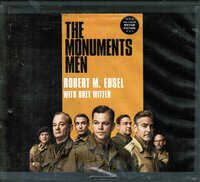You need to sign in or sign up before continuing.
Take a photo of a barcode or cover
616 reviews for:
The Monuments Men: Allied Heroes, Nazi Thieves, and the Greatest Treasure Hunt in History
Robert M. Edsel
616 reviews for:
The Monuments Men: Allied Heroes, Nazi Thieves, and the Greatest Treasure Hunt in History
Robert M. Edsel
A Reader's Corner Highly Recommended Read. This is the classic true story of the Allied effort to save the world's art treasures and architecture from destruction during WWII. The small but gallant force of men and women who gave their all to save world culture for posterity is a story few know, but one that everyone should take the time to learn.
A recounting of the men and women who risked their lives behind enemy lines to protect the art and history treasures of Europe during WWII.
The first I had ever heard of the Monuments men was the announcement of the movie based on this book which I found quite surprising considering the scope of their operation and the fame and notoriety of many of the pieces of art they rescued. I did not see the movie but I’m very glad I read the book.
I love history and I love art, so the topic of this book was perfect for me and I learned a lot of things I did not know before, so I appreciated all the details included though I can see how for some that could be a detriment. There are times when this book is very detail dense and it does slow the reading pace down, but I found it worthwhile for all that I learned.
Definitely for fans of art history and a wonderful example of what we can accomplish even in the darkest times.
The first I had ever heard of the Monuments men was the announcement of the movie based on this book which I found quite surprising considering the scope of their operation and the fame and notoriety of many of the pieces of art they rescued. I did not see the movie but I’m very glad I read the book.
I love history and I love art, so the topic of this book was perfect for me and I learned a lot of things I did not know before, so I appreciated all the details included though I can see how for some that could be a detriment. There are times when this book is very detail dense and it does slow the reading pace down, but I found it worthwhile for all that I learned.
Definitely for fans of art history and a wonderful example of what we can accomplish even in the darkest times.
Five stars in terms of how much I would recommend everyone read this book. (Although it would be slow going if you don't like biographies and such.) Minus one star for the writing - in a few cases, I thought it could have been much better.
I love how the story was told, though, and the pace at which real-life events were revealed. These men and women were members of the Great Generation, for the most part, and, for the most part, never tooted their own horns. This story needed to be told.
When we visit museums, we ought to have this story and stories like it in mind. For that matter, when we visit families' homes, we ought to be mindful of the fact that "more than anything, the Nazis robbed families: of their livelihoods, their opportunities, their heirlooms, their mementos, of the things that identified them and defined them as human beings."
I wrote elsewhere: "The book The Monuments Men, along with at least a little knowledge of World War II and the evils of Nazism, is an amazing book for reflection. Not only did the Nazis take away humanity by literally taking human lives, they stole it in the form of art and culture. The goal was to wipe out: to wipe out millions of people and to wipe out (or simply steal and claim as "Germanic") all traces of their cultural contributions. The obviously bureaucratic phrase in Nazi documents (translated to English) that sickens me the most is the often-used 'ownerless Jewish possessions.'
"Piles of gold tooth fillings next to piles of Vermeers, Rembrandts, da Vincis and the like. Are these just objects? No. They have a significance."
The Monuments Men were forgotten - or never noticed - until very recently. We can learn a lot from their work, their passion, and their sacrifices.
I love how the story was told, though, and the pace at which real-life events were revealed. These men and women were members of the Great Generation, for the most part, and, for the most part, never tooted their own horns. This story needed to be told.
When we visit museums, we ought to have this story and stories like it in mind. For that matter, when we visit families' homes, we ought to be mindful of the fact that "more than anything, the Nazis robbed families: of their livelihoods, their opportunities, their heirlooms, their mementos, of the things that identified them and defined them as human beings."
I wrote elsewhere: "The book The Monuments Men, along with at least a little knowledge of World War II and the evils of Nazism, is an amazing book for reflection. Not only did the Nazis take away humanity by literally taking human lives, they stole it in the form of art and culture. The goal was to wipe out: to wipe out millions of people and to wipe out (or simply steal and claim as "Germanic") all traces of their cultural contributions. The obviously bureaucratic phrase in Nazi documents (translated to English) that sickens me the most is the often-used 'ownerless Jewish possessions.'
"Piles of gold tooth fillings next to piles of Vermeers, Rembrandts, da Vincis and the like. Are these just objects? No. They have a significance."
The Monuments Men were forgotten - or never noticed - until very recently. We can learn a lot from their work, their passion, and their sacrifices.
Came to this via the film. The film grows on me the more I watch it but I was frustrated at the lack of detail and little off topic meanderings. Was greatly satisfied on the detail here. The size of the group, the sheer amount of work and effort involved, and the recent acknowledgment of their services after decades of passing notice. Why only three stars? It was hard to follow at points. Keeping track of all the minor officers and keeping everyone's missions straight while context of what was going on in combative efforts took some doing. I can see why they really trimmed it down for the film - too much but still. I did, however, get what I was looking for though and I definitely recommend it for anyone who wants to know more after seeing the film or perhaps avoided the film entirely.
Really interesting material, but the writing was a full on mess. I gave up trying to find a through line to tie the narrative together. I never knew what year it was, where I was in Europe, who I was reading about at any given time. Worth reading for the history, it was just really slow going getting through the book.
A good book. A bit hard to follow all of the military movements and action, not knowing a lot of the details of WWII. More plot-driven and less character. Fast-paced, serious.
I'm in that space where I feel like I'm handing out too many 4-star reviews. What can I say? I like books a lot, & I feel like I learned so much from this one.
Like, Rose Valland, why haven't I heard of her before? (Actually I think I saw "the Train" on the classics channel, but I don't remember her. Probably because Burt Lancaster.) She's my favorite kind of spy: middle-aged female who can alternate being intimidating (due to brains) or utterly invisible. All women have this power. Or are granted it as they age. But she used it to save priceless pieces of culture!
I found the audio book very easy to listen to - a bit dry at times, of course, this isn't fiction.
The story of art and art theft - and how much we lost - demonstrates (again) why we should be past this obsession with blowing things up. Art transcends national borders - art is worth living for. How much was destroyed just today because men can't see past their own entitlement? FFS
Like, Rose Valland, why haven't I heard of her before? (Actually I think I saw "the Train" on the classics channel, but I don't remember her. Probably because Burt Lancaster.) She's my favorite kind of spy: middle-aged female who can alternate being intimidating (due to brains) or utterly invisible. All women have this power. Or are granted it as they age. But she used it to save priceless pieces of culture!
I found the audio book very easy to listen to - a bit dry at times, of course, this isn't fiction.
The story of art and art theft - and how much we lost - demonstrates (again) why we should be past this obsession with blowing things up. Art transcends national borders - art is worth living for. How much was destroyed just today because men can't see past their own entitlement? FFS
This is the most interesting poorly written book I've read in a long time. The topic is fascinating for history buffs and you want to follow the stories of the real people profiled. But as other reviewers have mentioned, it desperately needed an editor. It had the feeling of a book that had been written and then some new stuff was discovered so everyone just started cutting and pasting new sections into it. Another possibility is that the editor, author and named ghostwriter might have re-arranged the copy multiple times and finally just run out of time to make it coherent. The repetition, the clunky transitions and the cliches were like nails on a chalkboard. The Altaussee mine and Rose Valland portions are told in a particularly awkward fashion that detract from the genuine drama of the situations. But if you have a good understanding of World War II history, you can enjoy this book. It's fairly easy to skip over the repetitive parts (hint: Hardly any of the letters home are worth reading).
Solid history book; the attempt to tell the story dramatically is a fun one, but sometimes the book gets too caught up in its own concept and suffers a bit for it. While drama is fun, lets not forget that this is a history book and *Spoilers* the Nazis lose. While the fates of individual people and works of art is completely unknown to most readers when the book begins, the effort to create drama makes the book stall a bit in the middle.
That's the worst I can say about it; recommended read if you like history or art or art history.
That's the worst I can say about it; recommended read if you like history or art or art history.
It took me a while to get into, but sort of ended up being a page turner! I think the movie (which I saw but only vaguely remember) must have deviated from it pretty far.




